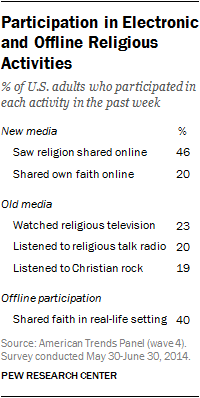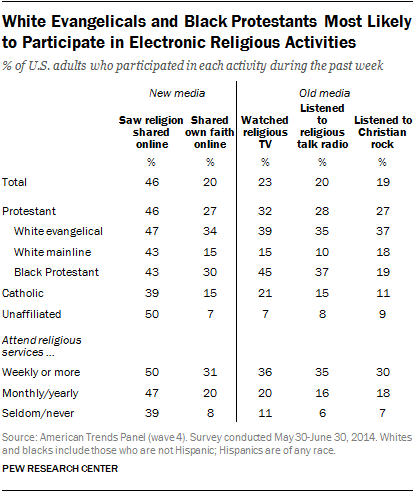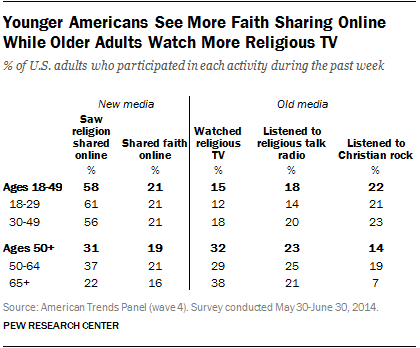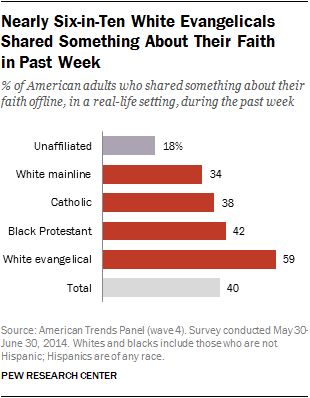
In an average week, one-in-five Americans share their religious faith online, about the same percentage that tune in to religious talk radio, watch religious TV programs or listen to Christian rock music. And nearly half of U.S. adults see someone else share their religious faith online in a typical week.
These are among the key findings from a survey conducted in May and June of 2014 that asked 3,217 adults from the Pew Research Center’s nationally representative American Trends Panel whether they had engaged in various kinds of religious activities during the previous week.
Fully 20% of Americans said they had shared their religious faith on social networking websites or apps (such as Facebook and Twitter) in the past week, and 46% said they had seen someone else share “something about their religious faith” online. The percentage of Americans who shared their own faith online is similar to the proportions who said they watched a religious TV program (23%), listened to religious talk radio (20%) or listened to Christian rock music (19%). Even more (40%) said they shared something about their religious faith “offline, in a real-life setting.” By way of comparison, in Pew Research telephone surveys conducted in 2014, 35% of Americans have reported attending religious services at least once a week.
The survey suggests that religious engagement through TV, radio, music and the internet generally complements – rather than replaces – traditional kinds of religious participation, such as going to church. Americans who said they frequently attend religious services were more likely to engage in these electronic religious activities than those who said they attend religious services less often. And white evangelicals and black Protestants — two groups with high levels of traditional religious observance — shared their faith online, watched religious TV and listened to religious talk radio more often than other large U.S. religious groups.
The survey also finds that young adults (ages 18-29) are about twice as likely as Americans ages 50 and older to see people sharing their faith online. This pattern reflects broader generational differences in technology adoption and media consumption, with young adults using the internet more than older people do. By contrast, watching religious television is considerably more common among older adults than among those under 30.
Electronic Forms of Religious Engagement

The survey finds that white evangelicals and black Protestants are far more likely than other major U.S. religious groups to say they watched a religious television program, shared their faith online or listened to a religious talk radio program during the previous week. And listening to Christian rock music is much more commonly reported by white evangelicals than by other religious groups that are large enough to be analyzed in the survey.
There are smaller differences between religious groups when it comes to seeing other people share their religion on social media websites or apps. For example, 50% of religiously unaffiliated adults say they saw someone else share something about their religious faith on social networking sites or apps during the past week, about the same as the share of white evangelicals (47%) and somewhat higher than the share of Catholics (39%) who report seeing someone else share their faith online.
Americans who say they attend religious services frequently are more likely to say they engage in electronic forms of religious activity than those who attend services less often. For example, among adults who say they attend religious services at least once a week, 31% report sharing their faith online in the previous week, compared with just 8% of those who seldom or never attend religious services. And those who attend services weekly are nearly six times more likely to say they listen to religious talk radio than those who seldom or never attend services at a church or other house of worship (35% vs. 6%).

Nearly six-in-ten adults under age 50 (including 61% of those ages 18-29) say they saw someone else share their religion online in the past week. Far fewer older adults (37% of those ages 50-64 and 22% of those 65 and older) say they saw online faith sharing in the preceding week.
Older adults, by contrast, are far more likely than younger adults to say they watched religious television in the past week. One-third of Americans ages 50 and older (including 38% of those 65 and older) say they watched religious television in the past week, compared with just 15% of adults under 50.
Offline Faith Sharing

Roughly six-in-ten white evangelical Protestants report that they shared something about their religious faith offline, in a “real-life setting,” during the preceding week.1 Roughly four-in-ten black Protestants (42%) and Catholics (38%) also say they had shared their faith in the previous week, as do 34% of white mainline Protestants. Among religious “nones,” 18% say they had shared something about their religious views offline in the last week.




